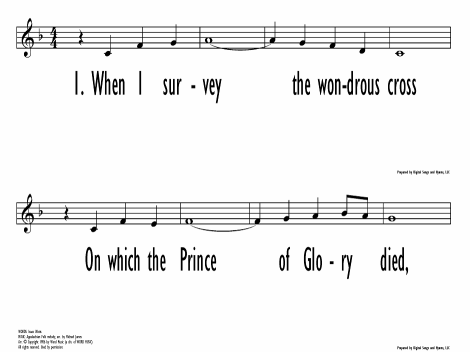- |
User Links
As Moses Raised the Serpent Up
Hymn Information
- First Line
- As Moses raised the serpent up
- Versifier
- Marie J. Post (1985)
- Tune Name
- O WALY WALY
- Arranger and Composer (descant)
- Emily R. Brink, b. 1940
- Tune Source
- English folk meldoy
- Topic
- Biblical Names and Places: Moses · God's: Might · God's: Salvation · Jesus Christ: Confidence in · Jesus Christ: Savior · Jesus Christ: Son of Man · Responses: To Confession · Elements of Worship: Forgiviness and Grace
Copyright Information
- Text Copyright
- © 1987 Faith Alive Christian Resources
- Tune Copyright
- arr. and descant © 2001 Faith Alive Christian Resources
- Reprint/Projection Information
- Words and Music: Permitted with a license from CCLI.com or from OneLicense.net. If you do not own one of these licenses, please contact the copyright holder for permission.
Scripture References
Further Reflections on Scripture References
John 3:14-17, part of Jesus' nighttime discourse with Nicodemus, forms the basis of this song and includes that famous profession of faith "God so loved the world. . . ," one of the best-known and most frequently memorized verses in the entire Bible. In this setting that profession is used virtually as a refrain but is numbered as stanzas 2 and 4 for emphasis.
Bert Polman, Psalter Hymnal Handbook
Confessions and Statements of Faith References
Further Reflections on Confessions and Statements of Faith References
The Catechism says that those who know Christ’s forgiveness are “to thank God for such deliverance” (Heidelberg Catechism, Lord’s Day 1, Question and Answer 2). As a result, “With our whole lives we may show that we are thankful to God for his benefits, so that he may be praised through us, and that we may be assured of our faith by its fruits, and so that by our godly living our neighbors may be won over to Christ” (Heidelberg Catechism, Lord’s Day 32, Question and Answer 86).
As Moses Raised the Serpent Up
Assurance
Blessing/Benediction
Additional Prayers
As Moses Raised the Serpent Up
Tune Information
- Name
- O WALY WALY
- Key
- G Major
- Meter
- 8.8.8.8
Recordings
Musical Suggestion
As Moses Raised the Serpent Up
Hymn Story/Background
Author Information
Composer Information
In 1977 she was appointed to the Psalter Hymnal Revision Committee, and in 1983 moved to Grand Rapids in a change of careers to become the first music and worship editor of the Christian Reformed Church. She was the founding editor of Reformed Worship; editor of the Psalter Hymnal (1987), Songs for LiFE (1994), Sing! A New Creation (2001, 2002); co-editor with Bert Polman of The Psalter Hymnal Handbook (1998), and editor of many other worship-related publications. Since 1984 she has been an adjunct professor at Calvin Theological Seminary, directing the seminary choir in the first years, and introducing courses on church music and worship before being granted emeritus status in 2009.
Her ecumenical work began with the Hymn Society in the United States and Canada, becoming the first woman president (1990-1992); in 2006 she was named a Fellow of the society in recognition of distinguished services to hymnody and hymnology. She served in both local and national offices of the American Guild of Organists, and has been a member for more than twenty years of the Consultation on Common Texts, serving as chair from 2008 to 2014.
In 2002, she became a Senior Research Fellow at the Calvin Institute of Christian Worship, contributing to The Worship Sourcebook and other publications; serving as program chair of the annual Symposium on Worship; and helping to plan and participate in worship conferences in more than fifteen countries.


 My Starred Hymns
My Starred Hymns






